Questioning the Questions

Which is more meta, this online Guardian poll asking if the “Newsweek Daily Beast Company merger” is “the way forward for journalism,” or this online Daily News poll asking if online polls are believable? Don’t tell us your answer in the comments.
James Frey, Inc.: A Million Little YA Deals
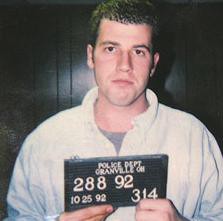
You may or may not have known that author James Frey has been working as a Big Businessman for the last few years! Here is how his company works, according to today’s fascinating New York mag story: “In exchange for delivering a finished book within a set number of months, the writer would receive $250 (some contracts allowed for another $250 upon completion), along with a percentage of all revenue generated by the project, including television, film, and merchandise rights — 30 percent if the idea was originally Frey’s, 40 percent if it was originally the writer’s…. Full Fathom Five could use the writer’s name or a pseudonym without his or her permission, even if the writer was no longer involved with the series, and the company could substitute the writer’s full name for a pseudonym at any point in the future. The writer was forbidden from signing contracts that would “conflict” with the project, without specifying what that might be. The writer would not have approval over his or her publicity, pictures, or biographical materials. There was a $50,000 penalty if the writer publicly admitted to working with Full Fathom Five without permission.” Honestly, I sort of love it. It’s brutal and Randian and hilarious and full of mayhem, just like book publishing itself. And it really is kinda like Warhol’s Factory, except everyone’s trying to get rich instead of famous and/or high. Parties probably aren’t as good I guess though.
New Jersey Family Averse To Exercise
New Jersey governor Chris Christie canceled the proposed Hudson River rail tunnel because his wife didn’t want to walk half a block to Penn Station.
Rumors Say At Least One Nobel Peace Prize Winner Might Be Freed Today

Everyone thinks that Aung San Suu Kyi will be released from her long-time confinement. But no one knows why they think that — and this in a country largely without a free Internet. One politico does claim that sources tell him she’ll be freed. So this sort of communication happens natively to people in general, not just in over-teched societies. Also, Jeff Goldblum is still alive.
Blueberry-Cranberry Sauce
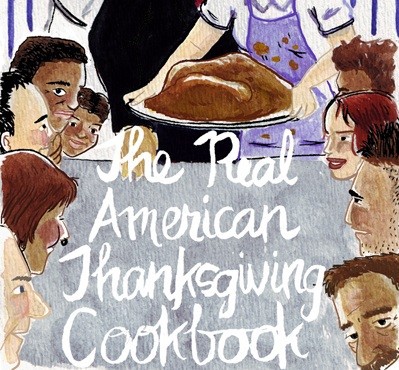
One of my father’s better tendencies is to take in human beings who have somehow been led astray. He never once coddled me or my brothers in our childhood, and I’ve always known him to look at even his few close friends with a hint of suspicion in his eyes. But around loners, rejects and the generally downtrodden, the old man opens up, guffawing at their jokes and putting his arm around their burdened shoulders like he’s an old fraternity brother of theirs.
As a defense attorney in Ohio, my dad would accept food in lieu of money from his poorer clients, and work into the night as if he were being paid in bullion instead of sweet potato pies. On a family trip to Alabama when I was eight, I remember slowly backing away from a truckload of bearded white men who’d parked their primer-gray truck, complete with dozens of Confederate flag stickers, next to my family as we fished on Lake Martin. The men were grizzled, blasting country music and covered in bad tattoos, some of which were still more Confederate flags. Yet no more than 20 minutes had passed before my father, the black, Yankee, jazz enthusiast lawyer, was having a beer with them and laughing about Crimson Tide football.
“There’s no such thing as a bad person,” he once told me after I called a bank robber on the news a “bad guy.” “There are only people to whom bad things have happened.”
Though the instances are numerous, there’s no better example of my dad welcoming in outcasts than when he did literally that. I was about 14 when I came home from school one day and discovered a stranger putting his things into the dresser in my brother’s old room. He was a Latino kid, shorter and skinnier than me, but he narrowed his eyes like a man. “This is Alexis,” my dad said, as I peered into what was no longer my video game dungeon. “He’s going to be staying with us for a while.”
After dinner that night, when Alexis had gone to bed, I would find out that my father met the 15-year-old via a family friend of ours. This friend, a high school counselor, said that he knew Alexis could do well if only he were allowed to live in the right kind of environment. Alexis was a smart kid, but he would act out in class, and at night he would return home to an alcoholic father who kicked his ass. My dad agreed to take Alexis in until he could find somewhere more familiar and closer to his high school to live.
Our conversations were shaky at first — Alexis was raised in South Tucson, a place not too far from my northern suburb in miles but tremendously distant in culture and income. (To this day, the craziest thing I’ve ever seen happened in South Tucson: a man riding a bike down the center of the street, smoking, his left hand on the handlebars, his right arm clutching a naked baby. This was at midnight.) But we eventually found common ground in rap music. I taught Alexis about East Coast artists and DJ Premier, while he schooled me on the funk-inspired gangsta rap that boomed out of practically every one of Tucson’s low riders.
As the weeks went on, Alexis and I grew closer, and we’d sometimes venture out to Tucson’s most popular attractions for young people — the mall or teen night at the roller rink. Alexis was the first guy I ever knew who wasn’t afraid to openly hit on girls, but he’d never make fun of me when I proved time and again to be a nervous, utterly silent wingman. He also never seemed ashamed of me, a relative spoiled square, when he’d introduce me to his friends from the south side, each of whom had the same age-belying swagger with which Alexis was blessed. “This is Cord,” he’d say. “He’s cool.” And like magic I was pounding fists with cholos named Puppet and Eduardo.
When November came, and Thanksgiving with it, Alexis told my dad that he didn’t want to impose on our family’s celebration. “I can go home,” he said. My father shook his head and said, “You are home. You’re a part of this family now, too.”
That Thanksgiving was the first for which I’d ever tried to make a dish, a simple, sweet cranberry-blueberry sauce I’d learned in Home Ec. It was a hit, and after the meal I leaned back in my chair to torpidly revel in my new culinary status. It wasn’t until I went to ask Alexis to play Nintendo that I’d noticed he’d left the table. Also missing were everyone’s plates, and most of the serving dishes.
Looking beyond my brothers, who were play-fighting and hoisting their children into the air, I saw then that Alexis was in the kitchen, the sleeves on his Ben Davis work shirt rolled up to his elbows, silently washing the tipping towers of plates and pans. He hadn’t said a word to anyone, just stood and gone to work.
“Do you want some help with those?” I asked. But he shooed me away. “Nah, man,” he said. “Go chill out. I’ll be there in a second.”
Never had someone just a year older than me made me feel so young.
Alexis left our home for a friend’s place a little before Christmas of ’96. And in 1999, he graduated from high school — barely, but it was something he once told me he’d never do at all. When I went away to college, Alexis and I mostly fell out of touch, but I’d get updates from my dad about his progression, his struggles, how he was trying to balance his old life with his desire to succeed at something.
Three weeks before Christmas in 2004, Alexis was shot 10 times after getting into an argument with a man at a house party. His killer, who’d eventually be convicted of first-degree murder, said he feared for his life when Alexis shoved an iron coat rack at him. Alexis was 23, and he left behind a new wife, a steady job in sales and hopes for a family of his own. In an e-mail notifying me of the murder, the only thing my dad wrote was “I truly thought he was going to make it.”
Nowadays, I’m still mostly useless in the kitchen, and my veganism doesn’t allow for many great Thanksgiving dishes. But when the food’s all gone, and people are retreating to whatever corner of the couch on which they’ll fit, I like to make up for my dearth of cooking skills by clearing the table and taking my place at a big sink. I like to submerge my hands in some warm water and scrape at the tough spots on the casserole dishes. I like to do what little I can to make things clean.
10-ounces of fresh cranberries
10-ounces of fresh blueberries
1 cup of water
1 cup of sugar
1. Pour the cranberries into a large saucepan and add the water and sugar.
2. Turn the heat to medium-high and stir until the sugar melts and the berries begin popping.
3. Add the blueberries and bring the mixture to a boil.
4. Reduce the heat to simmer the mixture and cook for 10 more minutes.
5. Remove from heat and cool to room temperature.
6. Do those dishes.
Cord Jefferson writes for The Root, Wonkette and The American Prospect.
Political Celebrity Currency After the Election: Where's Palin Now?
by Elizabeth Currid-Halkett
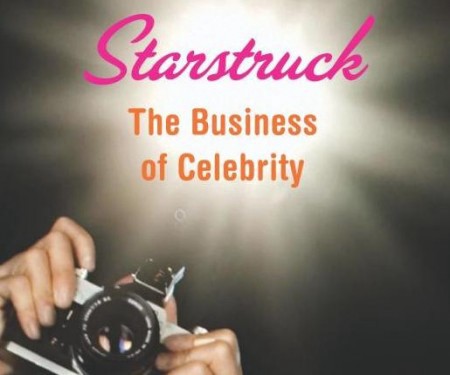
While the House adjusts to the new dichotomous reality, it’s time for us to take a tally of the stars and the has-beens of the midterm election.
Goodbye Blanche Lincoln and goodbye Arlen Specter. Hello Rand Paul, Jerry Brown (again!) and Harry “that was close” Reid. Even with the close saves in the Democratic Party, the GOP grabbed 60 new seats in the House. While the Dems maintain a cold, death-like grip on the Senate, the party was even more devastated by the GOP tsunami than anticipated. And among the winners, no one star shines so brightly as Sarah Palin, whose luster has been exponentially fuelled by each of her endorsed candidate’s wins.
She’s no Bill Clinton, in terms of charisma, but her influence on the outcome of the election is without question, and her leadership on the right is unchallenged. Her opportunistic “SarahPAC” commercial — a hollow caricature of patriotism — released just a day after the Democratic bloodbath intentionally associated Palin with the GOP coup d’etat.
But let’s not forget that Palin actually doesn’t hold political office. And that the Tea Party that continues to support her isn’t a mainstream political party (yet). And that only 15 of Palin’s 34 endorsed House candidates actually won their seats. Sure, Rand Paul secured Kentucky and Michael Grimm toppled New York Democrat Michael McMahon, but consider Palin’s charlatan tag team: Sharron Angle and Christine “dabble into witchcraft” O’Donnell. These candidates were a circus show that Palin supported all the way — and they were highly visible losses.
But the Tea Party, and Palin for that matter, are an idea and a brand and not directly connected to reality. And as in Hollywood, ideas and brands can be, at least in the beginning, far more powerful than substantive. Celebrity, that magical and nebulous quality that makes us fascinated with some people more than others, enables people like Palin to transcend their lack of talent. Let’s not forget that O’Donnell — despite being a totally unqualified candidate — was covered more than any other politician during the campaign season. Our interest hinges on them as people, or on our perceptions of them, rather than on what they’ve actually contributed to the world at large. This is the same phenomenon that occurs when Lindsay Lohan’s face is plastered across every tabloid, even though she hasn’t starred in a good film since Mean Girls (or probably, more accurately, The Parent Trap). The same phenomenon occurs when, despite the fact that Angelina Jolie has won an Oscar, we are still far more interested in her kids eating Cheetos. Oh the banality!
And the same goes for Palin, the political Paris Hilton. Like Paris, Palin is pretty, spouts truly ridiculous utterances and seems rather devoid of critical thinking. Also like Paris, she works incredibly hard to maintain and exploit her celebrity. Palin has used our collective interest in her persona to establish a brand that may take her straight to the head of the GOP ticket. (Which, to be clear, terrifies much of the GOP as much as it horrifies the Democrats). Like Paris, Palin’s genius is not in her substance but in her ability to assign value and influence to her vapidity.
But celebrities in the political realm, like their counterparts in Hollywood, must eventually be backed up with substance. As in Hollywood, celebrity-driven politicians reach the limit of their careers far more rapidly than those with talent. Some, like Christine O’Donnell, become a punch line before voting on Election Day even begins. Others, like Palin, are more strategic and thus are able to extend their influence for a longer time. If Palin is the Paris Hilton of politics, consider O’Donnell the Tara Reid — earnestly trying but ultimately screwing up at every turn.
It is those with talent who reap the ultimate rewards. Jolie, Obama and Clinton may have cults of personality but they are backed up by Oscars and political offices. Celebrity matters but it is insufficient on its own. In Hollywood and politics, the A-list possesses both talent and our attention, but it is the former that sustains their careers in the long term.
The alarming irony is that most of us started paying attention to Palin because we thought her similar to Hilton, Reid (Tara, not Harry) and Lohan: a fascinating yet fleeting train wreck. Yet despite Palin’s perpetual derailments she has managed to keep chugging along, sustaining our interest and threatening to snag the GOP presidential ticket in 2012. But we must hold out hope that given her ratio of talent to celebrity, it’s only a matter of time before we get bored — and when boredom at last sets in, Palin will disappear.
Elizabeth Currid-Halkett is the author of the brand new Starstruck: The Business of Celebrity
. It’s “a breakthrough inquest into the rattletrap culture of fame,” says Graydon Carter! So seriously, check it out.
Royce Mullins and The Case of Virtue's Burn, A Novel: Chapter 10
by Jeff Hart
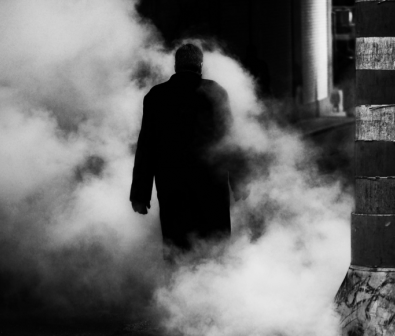
Wayne Maker had inspired me. I’d calmed down, centered myself with an entirely improvised breathing exercise, and had choked back the overwhelming desire to flee New York. When the diner ceiling had collapsed above Paul Fennel and I, it’d been the second time in as many days that the sky had opened at the will of God and dumped trash at an uncomfortable proximity to my person. I’d argue that I had good reason to be a little shaken; that maybe my instincts were as blunted as Dot had warned, that I wasn’t up to juggling homicidal marines, ingratiating self-help gurus, and a variety of supernatural warnings that two days ago I would have brushed off, but that now seemed like existential bullets aimed at a soul I wouldn’t admit to having. I needed to keep it together. Fennel was right, I was the knot that inexplicably bound this case and so, after wandering only three blocks from where Wayne Maker had dropped me, I’d already sharpened the edges of a plan to cut myself loose.
Step one was to exploit some homeless.
I found my guys in Tompkins Square Park, rummaging through the Chinese garbage that clogged the dog run.
“How’d you gentlemen like to clear a quick twenty bucks?”
They looked at me with petulant skepticism. I realized I couldn’t have appeared much different from one of their own. It no doubt would have amused Claudette that I was now mistaken so easily for a vagrant. As one of the other life-affirming decisions I’d made in the afterglow of my meeting with Wayne Maker was to never return to the stale futon and pile of dirty clothes I’d once called an office and, more recently, my home, I suppose the bums’ assessment wasn’t that off the mark. I was, in point of fact, homeless.
But I still had a car, and I needed these filthy hobos to dig it free of the trash-drifts for me. I might’ve been in a state of dislocation, but I’d be damned if I’d be plunging into any more garbage piles. At least willingly.
I smoked a cigarette on the front steps of my building while my new hires freed my car of garbage, irresponsibly relocating it to a nearby fire hydrant. I didn’t comment on their methods or the begrudging slowness of their movements — it was the body language of the underpaid, and I knew it well.
I felt sentimental for the office upstairs, for the things I was leaving behind. But that place had been thoroughly corrupted by the recent incursion of marines and, long before that, the unexpected retreat of Claudette. It was long past time to get free.
A man without purpose is no man at all.
“I brought you this,” said Claudette, her arms clasped around a potted plant. “It doesn’t need much water. You should be able to handle it.”
I’d been smoking a cigarette, watching the foot traffic. I patted the step next to me and she sat, leaned against me.
“How long have you been sitting out here?”
“Not sure,” I replied. “Most of the day.”
“What’s the point?”
“Let the neighborhood know I’m open for business. Sort of like hanging a shingle.”
“People don’t hang shingles anymore, Royce. They go on the internet.”
“Not everybody. Not the people that’re looking for a guy like me.”
She studied my face and I pretended not to notice. Took a drag off my cigarette.
“You’re just content to let life pass you by,” she said, without malice. She wouldn’t always say it that way.
Five years later, the step next to me was empty. One of the bums waved his hand in my face.
“We’re finished,” he grumbled.
I paid him and headed down the street to Ahmet’s.
“You look worse than usual,” observed Ahmet, glancing up from the sports section as I entered his store.
“Thanks,” I grunted. “You mind?”
I trudged toward Ahmet’s office without waiting for a reply. For the time being Ahmet’s closet-sized back office would have to serve as the official nerve center of my palsied operation. It wouldn’t accommodate a futon, but at least it had a landline. Regardless, I wasn’t long for the Lower East Side.
Ahmet stopped me in the doorway.
“A weird kid dropped this off for you,” he said, handing me a key. “Forgive me for saying, but he seems a little delicate for you.”
“He say anything?”
“Yes,” said Ahmet, thinking. “He said he was sorry.”
I’d counted on Paul Fennel leaving me a way to track him down. The key belonged to a seedy motel room in Long Island City. I knew the place. It’d been a lucrative destination for me, the perfect spot to climax the many cheating spouse cases I’d worked over the years. So that’s where Fennel had been hiding out, communing with God on a mattress stained from any number of broken commandments.
“I don’t even want to know what you’re into,” said Ahmet.
“Nothing good,” I replied. “In fact, might be headed down a dangerous road and I’m packing a little light.”
Ahmet made a quick appraisal of my face and figured me for serious.
“Maybe I can help,” he said, and reached under the counter. “I keep this for protection.”
He handed me a dusty can of pepper spray. I laughed.
“This? You use this to ward off robbers?”
“Who would want to hurt Ahmet?” he shrugged, and then flashed me a pointed look. “I mind my business.”
I pocketed the spray and ducked into Ahmet’s office.
Last night, Yossarian had made it clear that my continued existence depended on my turning over Paul Fennel to him and his disquietingly silent partner Pilgrim. If I was going to free myself of this entanglement, it seemed like Yossarian’s string was the first in need of snipping. I called the cell phone number he’d shoved into my shirt pocket.
He answered on the first ring.
“Mr. Detective,” said Yossarian, his voice as smooth as bourbon cut with arsenic, “How does this fine morning find you?”
“Save it, hillbilly. I’m meeting with Paul tonight. You come scoop the kid up, and then we’re done.”
I gave him the address and hung up.
Outside, my car lurched into gear with a troubling cough. I was leaving the Lower East Side, maybe for good. The pain in my back had mellowed to an easily ignored ache. So this is what it felt like to be a man of action.
I drove toward higher ground.
Jeff Hart lives in Brooklyn. His other writing can be found over at Culture Blues.
Photo by Fabio, from Flickr.
Democracy In Alaska
Voter intent is hard to measure: “U.S. Sen. Lisa Murkowski’s campaign on Thursday accused observers for rival Joe Miller of making petty challenges in the counting of voters’ write-in ballots in an attempt to tilt the Alaska Senate race in their favor…. Shortly after the second day of write-in ballot counting began in the race, a Miller observer challenged a vote for Murkowski that appeared to have her name spelled and printed correctly, though the ‘L’ in ‘Lisa’ was in cursive handwriting.” [Via]
New York City and TGI Friday's Don't Support the Troops
by Abe Sauer
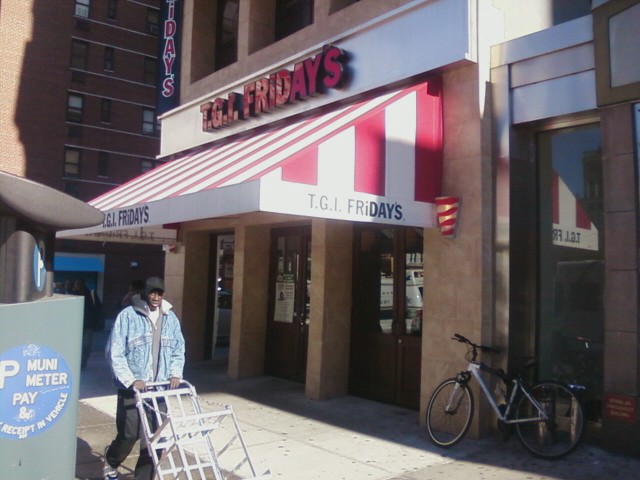
It is fashionable to despise the TGI Friday’s location in New York City’s Union Square. The reasons for doing so are usually some blend of self-serving pretension based on the chain’s food selection, its perceived Midwesternness (TGI Friday’s is headquartered in Texas) or one’s own coastal elitism.
But loathing the Union Square TGI Friday’s for cultural reasons is childish. There is a whole legitimate reason to detest the establishment. TGI Friday’s in Union Square doesn’t support the troops.
Like many businesses, TGI Friday’s offers special discounts and complimentary products and services to veterans and active military personnel on Veterans Day. These include Applebee’s, Outback Steakhouse, Subway, Chick-fil-A, Chili’s, Hooters, and Pizzeria Uno. Titletown Brewery offered vets free beer while employee-owned grocer Hy-vee hosted a breakfast buffet.
TGI Friday’s meanwhile is offering one free entree with the purchase of another from today through the weekend. Additionally, TGI Friday’s managers will present guest veterans with a $5 “bonus bite” card redeemable at a later date.
I spoke with John, a currently serving member of the army who has served in Afghanistan. (The 24-year-old requested his full name not be used.) Asked about the various free promotions, John said he did know about it. He said he had already gotten a free six-inch sandwich at Subway and that he planned of going to the Golden Corral free meal buffet on Monday with a few friends. He didn’t know if he would make it to TGI Friday’s but the deal sounded “not too bad.”
That deal probably wouldn’t sound too bad to anyone making what John does. An enlisted man with a couple years service, his paycheck is about $1,700 a month. Obama’s 2010 Presidential Budget called for a 2.9 percent increase in pay, the absolute minimum legally allowed by the Employment Cost Index. But John shouldn’t count on such wild generosity again in 2011. The “nonpartisan” Congressional Budget Office recently not only called the military pay gap, the amount that military pay lags behind private civilian pay levels, fictitious, but also declared the existence of a military pay surplus to the tune of a whopping 10.3 percent. That’s right, John is vastly overpaid for the job he does compared to civilians in private industry who, assumedly, perform the same job. If John continues to be so overcompensated, Congress risks having “trouble paying for new weapons….”
By the way, John would like to dispel the myth that he doesn’t pay taxes on that $1,700, because he certainly does. But hey, free housing.
Sure, all of these freebies are in some way meant to be advertisements for the chains themselves. But so what? Hopefully John manages to take advantage of all the complimentary goods and services available to him today, no matter how seemingly inadequate they are as a recognition for his service.
But, despite the chain’s gracious offerings and encouragement of “current and former members of our armed forces to let loose and have some much deserved fun,” he, and all of his fellow veterans, should steer clear of TGI Friday’s in Union Square.
The TGI Friday’s at Union Square (a 646 number, natch) told me that it was not participating in the Veterans Day promotion. This appears to be the norm in New York.
I called a random selection of “respectable” Big Apple eateries including the Gramercy Tavern, Le Bernadin, One if by Land, Two if by Sea, Mercer Kitchen, and Brooklyn’s The Grocery. All told me the same thing; there are no specials for veterans, currently serving or otherwise, on Veterans Day. This included TGI Friday’s Union Square-mate Blue Water Grill. The receptionist at Per Se asked me, “What day?”
So, it appears that TGI Friday’s isn’t ruining New York, but that New York is ruining TGI Friday’s.
Abe Sauer is like a runaway train.
Desperate, Brazen Women Acting Like Men
Desperate, Brazen Women Acting Like Men

Here is a thing that is apparently happening in Minnesota: chicks are hitting on dudes. Because of the feminism.
Researchers say part of the surge in female assertiveness in the social scene has to do with the long progression of the feminist movement. An increased confidence is natural as women have become more prominent in the workplace, gained more high-powered jobs and have begun out-numbering men in college enrollment and graduate and doctorate degrees.
Sadly for these newly empowered ladies, the article suggests that approaching a man might not provide the desired result, which is obviously marriage and lots of babies. Men will fuck these women, sure, but a University of Minnesota sociology professor reveals the cold, hard truth: “Research suggests when things progress as far as an actual date, men can be turned off by women they perceive as sexually aggressive. They may continue to see these women, but not view them as ‘marriage material.’”
Tough break, gals! If you want to get a ring on that finger — and you do — it’s back to the end of the bar for you. Just sit there and wait, a man is sure to turn up eventually. Also, you should probably wear something tight. [Via]
Photo by cavalierhorn, from Flickr.
